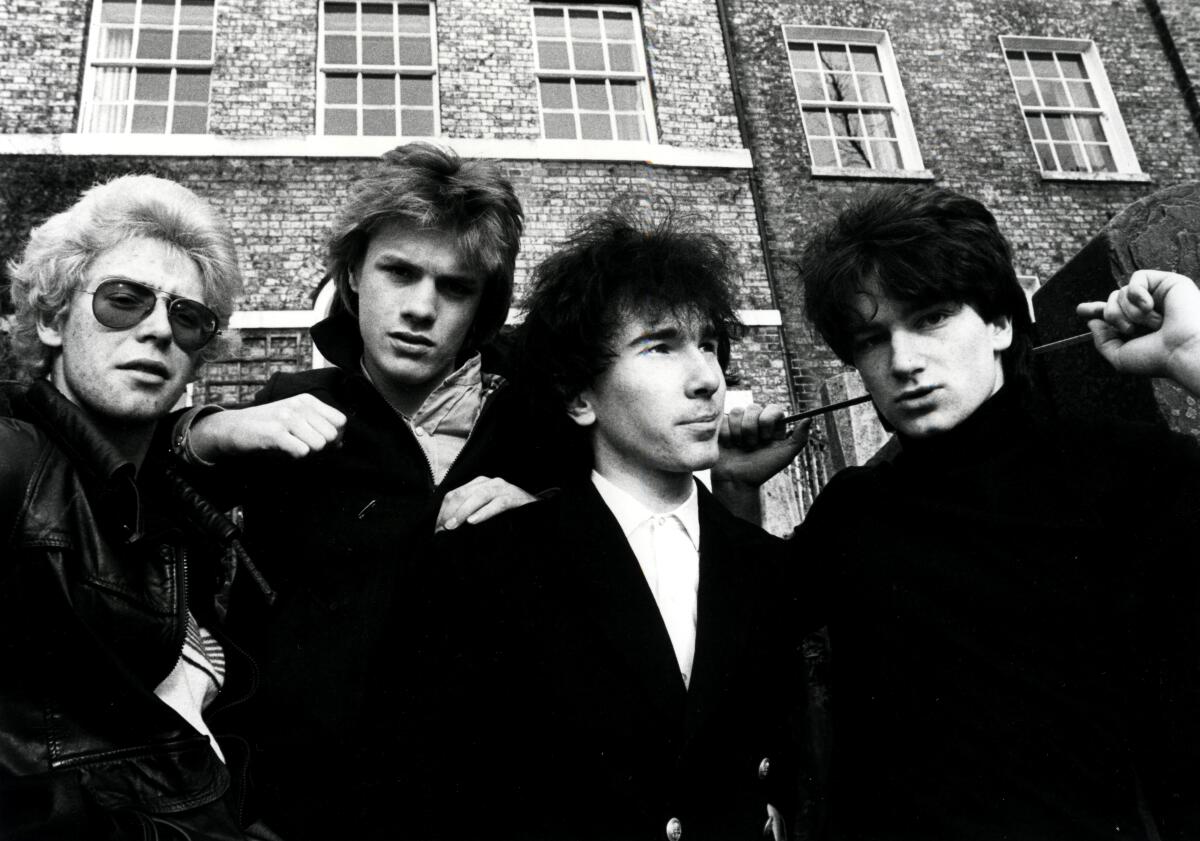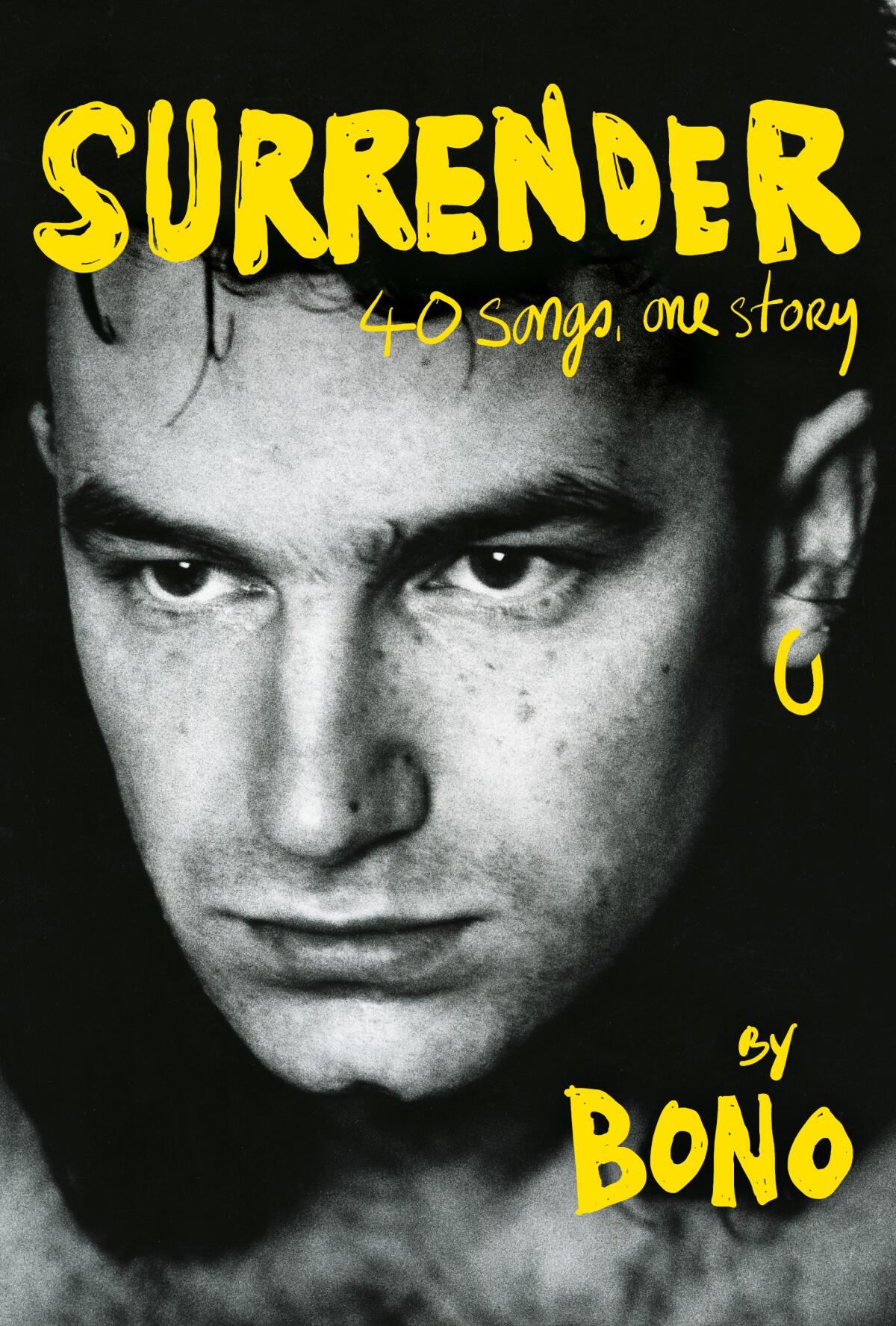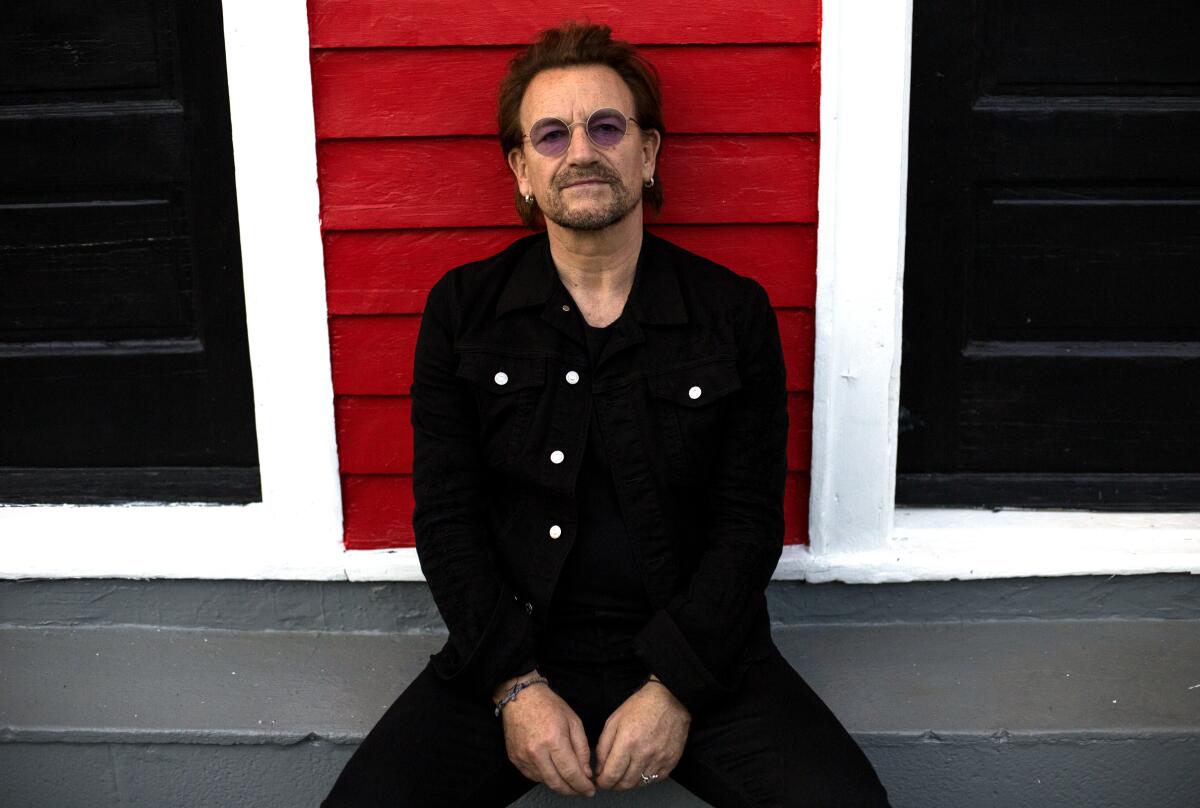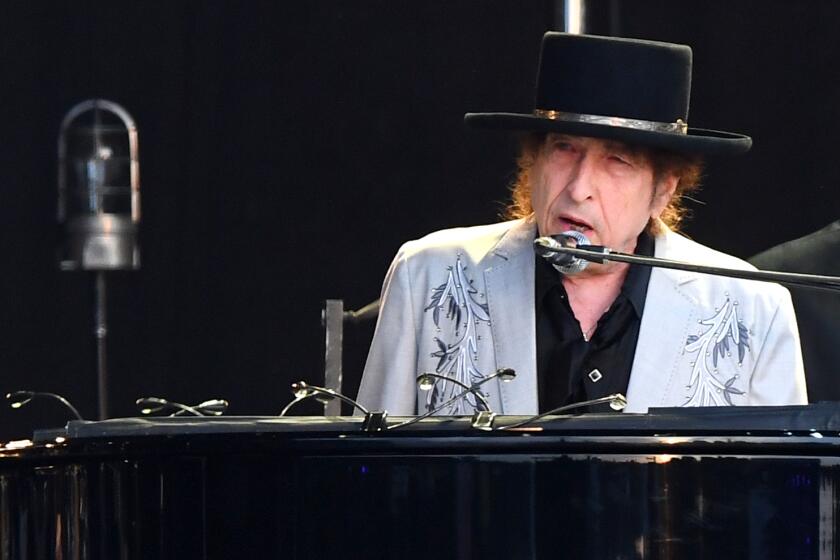Review: Bono humbles himself in a new memoir

On the Shelf
Surrender: 40 Songs, One Story
By Bono
Knopf: 576 pages, $34
If you buy books linked on our site, The Times may earn a commission from Bookshop.org, whose fees support independent bookstores.
Like a great many famous people who go by just one name, Bono isn’t really known for subtlety. As the lead singer and public face of U2, the biggest rock band on the planet during much of their existence, he fills stages and records with a largeness of self. He’s never been shy about wanting to change the world (not that there’s anything wrong with that). He has so much juice that he convinced Apple to flood every iTunes user with the 2014 U2 album “Songs of Innocence.” He’s kind of a big deal.
So it’s a pleasant surprise to discover that his first book, the musical memoir “Surrender: 40 songs, One Story,” is defined largely by humility. This is an introspective story written by a man whose spirit is never far removed from the sadness and grief of his childhood; the hunger, literal and figurative, of a teen wannabe rocker; and the gratitude of one who worked his butt off and made it to the top. Some have speculated that a ghostwriter is responsible for these pages. His publishers say no, and I believe them. The tone feels too honest and direct, the details and memories too sharp. And he apologizes for that whole iTunes thing.
Here is Bono on that all-important transporter of bands the world over: “The van is a time machine, the perfect size for the fledgling rock ‘n’ roll community: some musicians, a tour manager, a roadie or two, sometimes a manager. Later it may grow wings and become a private plane, but it will always feel roughly the same size as the van.”
In ‘The Philosophy of Modern Song,’’ the Nobel laureate blends together music criticism, beat poetry, wolverine snarls and Lear-on-the-heath tirades.
“Surrender” is more a van of a book than a private plane. It shrinks more ego than it inflates. Bono makes no bones about his outsized ambitions, but there’s always a fallible human being behind the big plans and then the superstardom. Sometimes he even sounds a wee bit embarrassed about his fame and fortune. He comes by his well-chronicled activism and philanthropy through what you are compelled to conclude is a hard core of sincerity.

Born Paul David Hewson in 1960 — his friend, the artist and musician Guggi, first called him Bono Vox, after the hearing-aid shop Bonavox, before shortening the nickname — Bono grew up middle class in a Dublin suburb, the son of a Catholic father and Protestant mother. He had a bit of a temper, which flared more often after his mother died of a cerebral aneurysm when he was 14. He describes a household of three men — himself, his father and his older brother, Norman — incessantly yelling at each other because that’s all they knew how to do: “Three men dealing with their grief by never talking about it.” But he learned to write songs about it, from “Iris (Hold Me Close)” to the auspicious first song to make its way onto a U2 album, “I Will Follow.”
However you feel about the bombastic stadium light shows of the later years, it’s a kick to picture the members of U2 making grilled cheese sandwiches on a portable heater and playing gigs to audiences of zero. At one sparsely attended show Bono heckled some sharp-dressed patrons from the stage, not knowing they were industry types who wanted to check out this buzzy new band.
“Surrender” reminds us that many of U2’s heroes were punk, and that before they became pop stars they were very much a post-punk act — although, for Bono, the band’s roots lay in altogether different soil. “U2’s music was never really rock ‘n’ roll,” he writes. “Under its contemporary skin it’s opera — a big music, big emotions unlocked in the pop music of the day.” Anyone who has thrilled to the emotional spectrum of “Where the Streets Have No Name” would find it hard to disagree.
Ukrainian President Volodymyr Zelensky invited U2 frontman Bono and the Edge to perform a mini-concert in Ukraine amid the Russian invasion.
“Surrender,” however, is by no means operatic. There’s a casual charm to the memoir, a feeling of being led through caverns of story by a guide with some things to get off his chest. While describing the production of the band’s breakthrough third album, “War,” for instance, our narrator interjects that he’s not always wild about being in the studio: “This is not an environment conducive to art. The room feels more like an operating theater than a stage, surgeons conferring on how best to fix the limp in question.” This is the rare rock star memoir written by a rock star who, you get the impression, could have been a writer — or at least might have wanted to.

Bono married his high school sweetheart, Alison Stewart, and they had four kids; there’s something of the regular dude about him, except for the hobnobbing with presidents and receiving invitations from Ukraine’s Volodymyr Zelensky and that sort of thing. Bono has never been a favorite of the “Shut up and play” crowd, but there is nothing in U2’s music that suggests innocently standing by. For every love ballad there’s a “Sunday Bloody Sunday,” a mournful yawp on the Irish Troubles that was actually written by U2 guitarist the Edge. In other words, call him what you want — he’s never inconsistent.
U2 fanatics might already know much of the material in “Surrender.” For the rest of us, there’s something to discover in every chapter. Bono has a gift for making even the unattainable seem relatable. He’s been accused of having a messiah complex; some of the book’s most arresting sections deal with his lifelong commitment to Christianity. But the believer who emerges from these pages springs from tenets of his faith in short supply today. He’s humble, even self-effacing. He might be fun to have a beer with. He is very much of this Earth, even if on occasion he might seem to float above the water.
The storied U2 frontman takes on his first substantial acting gig in an animated film that allows him to contemplate grief and the healing properties of music.
Vognar is a freelance writer based in Houston.
More to Read
Sign up for our Book Club newsletter
Get the latest news, events and more from the Los Angeles Times Book Club, and help us get L.A. reading and talking.
You may occasionally receive promotional content from the Los Angeles Times.







